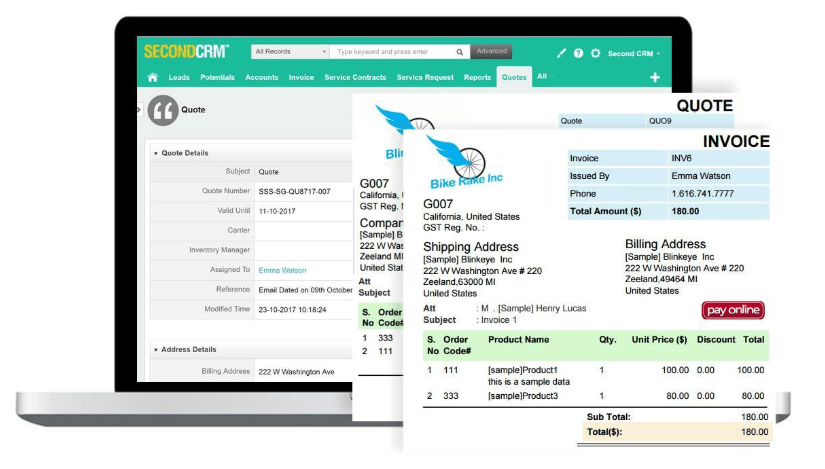Wouldn’t it be nice if you live in a world where every person who comes to you is an ideal candidate for your products and services? Interested customers come straight to you and you know exactly what they want, how they got there and how to win them over and provide them with the right information faster than your competitors.
While that kind of sales utopia may remain as a dream always, modern technology is helping businesses to streamline the overall sales experience. Lead management is one such process that helps you capture leads, track customer behavior and give them continuous attention to prepare them for sales and then finally pass to your sales team. Though this sounds simple enough, it is a complex process when the numbers are quite high. So let’s see how a CRM helps with managing and finally converting leads.
How CRM supports Lead generation?

A CRM is a very useful tool that simplifies the whole management aspects of businesses of every size. By implementing the right CRM, you can increase real-time decisions, improve sales results, close more deals and predict accuracy. An efficient CRM offers a broad range of functionalities at an affordable cost. CRM not only impacts business significantly, it also helps in nurturing leads and building better customer relationships that last even before customer interactions with the sales team begin.
Understand where to find your audience

The very first step of targeting the right customers is to understand where to find your target audience. For that, understand the type of problems your products and services solve and identify the type of people or brands experiencing those issues. The next step is to make use of CRM’s reporting tools to get a clear view of the purchasing habits and other details of your existing customers. Utilize forms, surveys and event registrations to collect significant data from customers and record that info into your CRM system. This type of info gives you the ability to interpret what kind of customers to target, where they are located and the best time to contact them. Once you have the complete demographic data, it is easy to customize your marketing efforts to motivate your target customers to make purchases.
Do effective marketing campaigns

Whether it is about using the advantages of segmentation features to build shared customer groups, profiting from pipeline opportunities or campaign reporting, the impact of CRM on marketing is huge. With the use of CRM, you can fulfill business objectives by providing you with strong fact-based insight into your target audience and prospects. CRM tools give a detailed look at the opportunity pipeline which can be put in an order with every opportunity to a particular marketing campaign.
Utilize the power of social networking

The quickest and direct way of connecting with your clients is via popular social networks. This includes social media platforms like LinkedIn, Facebook, Instagram, Twitter and you just need to be available to your target customers. By analyzing the customer information received in your CRM, you can create content like surveys on social networks based on the requirements of your clients. With the data retrieved from the CRM system, you can keep track of the type of content resonated with your social media audience to help you create content that drives businesses and generate more leads.
Gather important lead related info

You can use your CRM tool to collect important information that generates leads from a variety of sources. With a CRM, all lead relevant data flows to a single location. It can be data from the website, social networks, manual entries, and referrals. You can also segregate redundant information from relevant data and can easily delete it to avoid clutter.
CRM data helps in providing a detailed insight into your leads, their behavior, location, interesting niche, purchase patterns and so on. By this, you can track and analyze the lead profile like the types of leads most likely to convert, the number of calls needed for lead conversion etc.
Automate data entry process

CRM data is vital to the plan of sales strategy, metrics, and generation of reports. To make this possible, all essential customer data must be inputted to the CRM in a timely fashion. However, to achieve this, your sales team shouldn’t spend their valuable time managing and entering data manually. This is where a CRM comes into play to save your efforts and valuable time. Automating your data entry process will give your sales team enough time to focus on their activities related to conversion and sales as a CRM takes control of the lead database management.
Optimize sales process

The sales process of a business is multifaceted and hence complex. It requires going through and managing a myriad of activities like demo calls, follow-ups, deadlines, data updates, and scheduled calls. Most CRM tools allow you to optimize workflow, support marketing automation, track sales and handle customer care. This includes creating specific sales templates, email templates to send messages to prospective clients and create customized campaigns for lead generation. CRM tools also help you track sales flow and organize sales opportunities for your business.
Conclusion
The size of sales growth and customer base of any business is dependent on the success of your lead generation efforts. However, you can use a CRM solution and master lead generation to improve your business. Alternately, the experts at SecondCRM can help you choose and implement the right CRM for your business. Contact us now.
